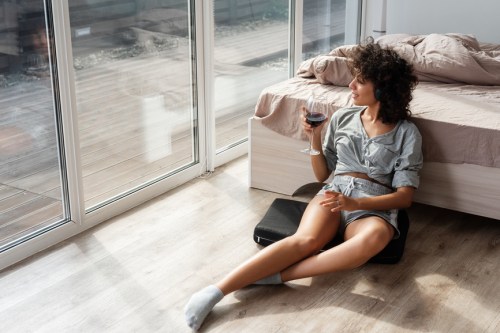Sleep Doctors Explain the Very Strange Ways That Alcohol Can Affect Your Dreams
Two sleep doctors explain exactly how alcohol affects dreams and sleep both the night of drinking and the following night.

Dreaming is a natural part of the sleep cycle. Some people wake up having absolutely no clue what transpired during their trip to Dream Land while other people wake up remembering their dreams so vividly that they can be hard to shake.
Experts in This Article
psychiatrist and founder of Menlo Park Psychiatry and Sleep Medicine
Timothy Young, MD, is a neurologist and sleep medicine doctor with Mayo Clinic.
There’s a lot that can influence dreams‚ including what unfolded throughout the course of the day, what you eat, and your sleeping position. Something else that impacts them: alcohol. It actually impacts your dreams not only the night of, but the following night as well. Curious to find out exactly how? Here, two sleep doctors explain.
How alcohol affects dreams that night
Neurologist and sleep medicine doctor Timothy Young, MD, says many people often get confused about how alcohol affects the sleep cycle. Since alcohol is a sedative and can make you sleepy, it’s natural to think it can lead to more restful sleep. In reality, he says it does the opposite. “We tend to fall asleep faster when we drink alcohol, but we also tend to wake up in the second half of the night,” Dr. Young says. “Overall, there is a decreased amount of time spent asleep when you drink alcohol.”
Psychiatrist and sleep medicine doctor Alex Dimitriu, MD, explains that there are three types of sleep: deep sleep, REM sleep, and light sleep. “When someone drinks alcohol, they spend less time in REM sleep, and that’s the sleep phase where we dream the most,” he says. If you have a few cocktails and then head to bed, Dr. Dimitriu says you can expect to have less dreams than you may have otherwise. But that doesn’t mean you won’t have any dreams at all. “People can still dream in the light sleep stage, but the dreams aren’t as strong as what happens in REM sleep,” he says.
Dreams in the light sleep stage, he explains, are less complicated and may relate more to simply what unfolded during the course of the day. Dr. Young agrees: “Maybe you hear a noise, or something in the room, when you’re in light sleep. That sound may come into an image you’re seeing [in your sleep],” he says, as an example.
Looking for a way to relax that doesn’t involve alcohol? Watch the video below to see how to make a kava mocktail:
How alcohol affects dreams the night after
But alcohol doesn’t just influence your dreams the night you’ve tossed a couple drinks back: both sleep experts say it’s the night after when things can really get crazy. “When you go to bed the next night, the body will spend more time in REM sleep, trying to make up for the time it lost the night before,” Dr. Dimitriu says. “This is why people often experience really vivid dreams the night after they’ve been drinking.” He explains that the more time you spend in REM sleep, the more time the brain has to weave together complicated plots and intricate details—a vast difference from the shallow, straight-forward dreams that happen in light sleep.
According to Dr. Young, alcohol can also affect how well you remember your dreams. In general, he says people tend to remember the last dream of the night they had—and even those details can fade quickly. But if you wake up in the middle of a dream, you’re more likely to remember it. Remember how you spend more time in the light sleep phase after drinking? Dr. Young says it’s easier to wake up in this phase, so you may wake up in the middle of one of the dreams you’re having. Again, these types of dreams often aren’t super intense, but you are more likely to remember them by waking up in the middle. Waking up suddenly—like when your alarm goes off—could also lead to waking up in the middle of a dream and therefore being more likely to remember it, Dr. Young says. And this is true whether you’re in light sleep or REM sleep.
What’s clear is that alcohol can directly affect your dreams. Anything that affects your sleep cycle likely will. Of course, both sleep docs want everyone to know they definitely don’t endorse drinking as a way to experiment with dreaming. They both underscore the fact that booze equals less time in REM sleep, the part of the sleep cycle crucial for overall health. But if you wake up wondering why the heck your dream had a plot more complicated and intense than an episode of Black Mirror, the happy hour you went to a couple of days ago could play a role.
Oh hi! You look like someone who loves free workouts, discounts for cult-fave wellness brands, and exclusive Well+Good content. Sign up for Well+, our online community of wellness insiders, and unlock your rewards instantly.
Sign Up for Our Daily Newsletter
Get all the latest in wellness, trends, food, fitness, beauty, and more delivered right to your inbox.
Got it, you've been added to our email list.










